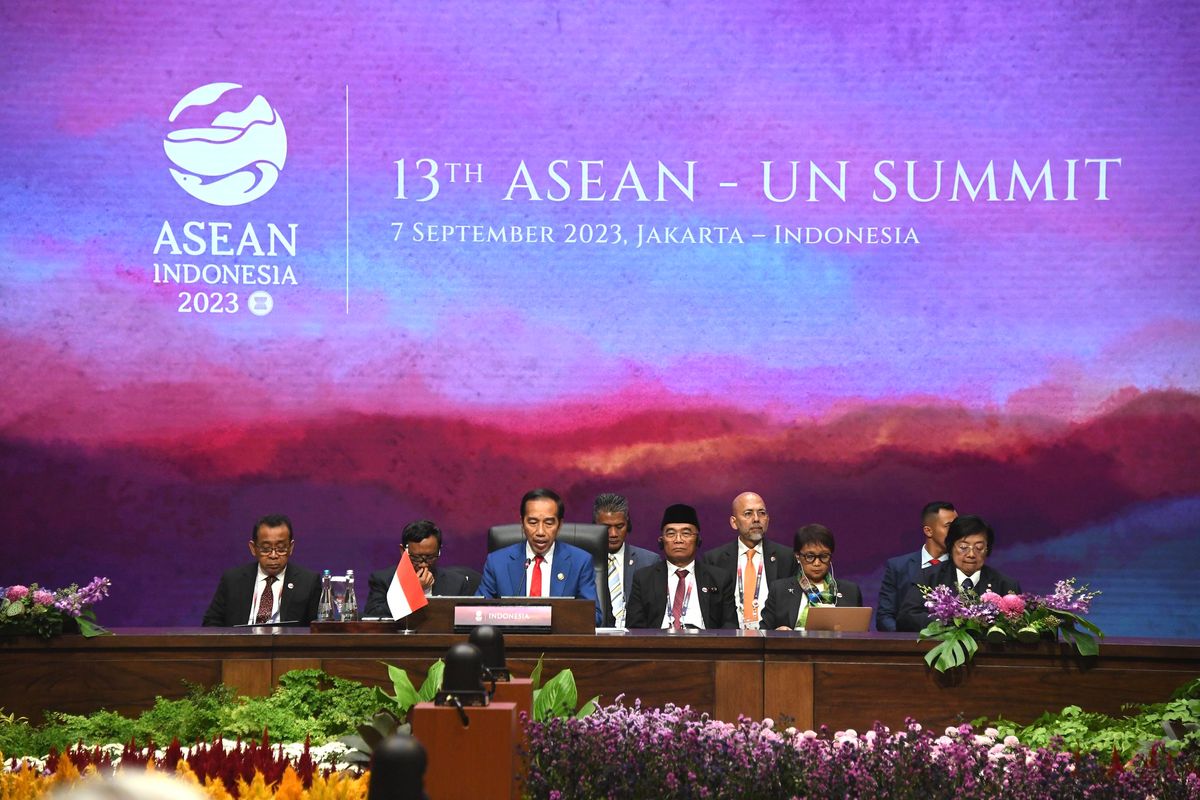U.S. and China Vie for Influence at ASEAN Summit in Jakarta

The Lede: Members of the Association of Southeast Asian Nations (ASEAN) convened in Jakarta, Indonesia this week for the union’s second summit meeting of the year. Officials from member countries and participating partner countries discussed the increasingly tense rivalry between the U.S. and China as well as overlapping claims in the South China Sea.
What We Know:
- U.S. Vice President Kamala Harris, Chinese Premier Li Qiang, Russian Foreign Minister Sergei Lavrov, Japanese Prime Minister Fumio Kishida, South Korean President Yoon Suk Yeol, and Australian Prime Minister Anthony Albanese among others joined the summit as partner countries.
- Li warned against slipping into a ‘new Cold War’ amid rising geopolitical tensions. Li and Kishida met on the sidelines of the summit on Wednesday to discuss Japan's recent release of treated radioactive water from the Fukushima nuclear plant. Li and Yoon met on the sidelines on Thursday to discuss China’s role in security and reconciliation on the Korean peninsula. Meeting with Li on Thursday, Albanese announced that he would be visiting China this year.
- Harris highlighted U.S. opposition against unilateral changes to the status quo in the East China Sea and the South China Sea in meetings with Kishida and Philippine President Ferdinand Marcos.
- Li also called on Japan, South Korea, and ASEAN to support Hong Kong’s bid to join Regional Comprehensive Economic Partnership (RCEP), the world’s largest free-trade pact.
The Background: For years, ASEAN has been working on a legally binding code of conduct in the South China Sea. China, Taiwan, and four ASEAN states – Brunei, Malaysia, the Philippines, and Vietnam all have overlapping claims over parts of the body of water, which is important for shipping, fishing, and energy resources. The U.S. has also been involved in the dispute over recent years with regular air and sea military presence. The 15-member RCEP pact is a free trade agreement made up of the 10 ASEAN nations, China, Japan, South Korea, Australia, and New Zealand. Hong Kong formally requested to join in January last year.
Likely Outcomes:
- The competition between the great powers is driving wedges among the ASEAN countries. Some are trying to take a middle path while others are picking a side. The overlapping claims in the South China Sea further complicate the issue as member countries have disagreements over those claims as well as the broad claims made by China over the maritime territory. Future directions for the members of ASEAN remain uncertain as both China and the U.S. compete for influence in the region. All parties agree that conflict should be avoided, but fundamentally disagree on how they should move forward in practice.
- Due to ASEAN and China’s existing economic ties as mutually the largest trading partners of one another, and the U.S. aiming to form ties in the region as an alternative to China, there may still be space for both superpowers to interact with ASEAN and its member states in the near-term. However, if interests exceedingly clash at some point down the road, the two superpowers may force ASEAN member states to pick a side after all. This already appears to be a major test for the solidarity of ASEAN.
Quotables:
“As long as we keep to the right path, no matter what storm may come, China-ASEAN cooperation will be as firm as ever and press ahead against all odds. We have preserved peace and tranquility in East Asia in a world fraught with turbulence and change.” – Li Qiang, Premier of China
ASEAN is at the center of America’s commitments to the Indo-Pacific. As the United States Indo-Pacific Strategy makes clear, we are committed to ASEAN centrality…The United States and the nations of Southeast Asia share many long-term interests and priorities, as well as a long-term vision.” – Kamala Harris, U.S. Vice President
"We all have a responsibility to not create new conflict, new tension, new war and at the same time we also have a responsibility to reduce tensions.” – Joko Widodo, President of Indonesia
Good Reads:
China’s premier is on a charm offensive as ASEAN summit protests Beijing’s aggression at sea (AP)
China warns against 'new Cold War' at ASEAN summit (Reuters)
Southeast Asians wary of new conflicts as big powers join ASEAN summit (Reuters)
In Southeast Asia, Kamala Harris is at the center of White House efforts to counterbalance China (AP)
Remarks by Vice President Harris at the 11th U.S.-ASEAN Summit (White House)
South Korea's Yoon urges China to do more to address North Korea threat (Reuters)
Chinese Premier Li Qiang urges Asean, Japan, South Korea to back Hong Kong’s RCEP trade deal bid (SCMP)
Australian PM to visit China soon as both sides hail progress (Reuters)
